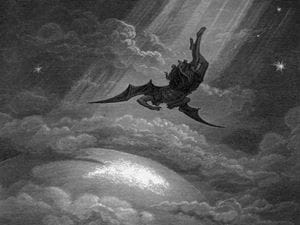
Abashed the Devil stood,
And felt how awful goodness is, and saw
Virtue in her shape how lovely—saw, and pined
His loss
-Paradise Lost
Grief.
We think that we know it. We mourn the transient nature of the world and the ravaging effects of time. We weep at the random devastation fashioned by nature, and cry out at the intentional destruction wrought by the hand of man. But as deeply as we feel, there is one creature in all creation whose grief is truly perfect in its agonies.
That creature is the Devil. You may have heard of him. But you don’t know everything.
Scripture says relatively little about the ancient adversary—this possibly reflects his disgrace—and the verses that do possibly speak of Satan have interpretations that are hotly contested within the Christian Church. But when the Bible is read as a whole, each of these verses is revealed to be a small part of a larger revelation concerning the story of Lucifer.
It is time to place together the pieces of this dark puzzle.
The Fall
Farewel happy Fields
Where Joy for ever dwells: Hail horrours, hail
Infernal world, and thou profoundest Hell
Receive thy new Possessor
Of all creatures in creation, Lucifer was once, quite possibly, the closest to God in heaven. The word “Lucifer,” comes from a Hebrew term that translates to “shining one”—he reflected the glory of God, just as the moon reflects the light of the sun. Ezekiel 28:13-15 is addressed to the “King of Tyre,” but it is soon apparent that these verses are addressing the power behind the king, and reveal Satan’s former glory.
“‘You were the seal of perfection, full of wisdom and perfect in beauty. You were in Eden, the garden of God; every precious stone adorned you: carnelian, chrysolite and emerald, topaz, onyx and jasper, lapis lazuli, turquoise and beryl. Your settings and mountings were made of gold; on the day you were created they were prepared. You were anointed as a guardian cherub, for so I ordained you. You were on the holy mount of God; you walked among the fiery stones. You were blameless in your ways from the day you were created till wickedness was found in you.”
Lucifer was perfect. Resplendent. Beautiful. And most important for the human understanding of him, he was—and is—an angel, with all of the accompanying attributes.
Angels are created beings that continuously praise, serve, and communicate with God, acting as His messengers and meting out His judgments. They are of an entirely different order than human beings, and do not possess physical bodies. Rather, they are purely spiritual beings who reside with God in heaven.
But if God is perfect love, why would a being that has seen God’s glory in person turn against Him?
Scripture gives us hints. Isaiah 14:12-15 is addressed to the King of Babylon, but draws on the imagery of something far older—the fall of Lucifer.
How you have fallen from heaven, morning star, son of the dawn! You have been cast down to the earth, you who once laid low the nations! You said in your heart, “I will ascend to the heavens; I will raise my throne above the stars of God; I will sit enthroned on the mount of assembly, on the utmost heights of Mount Zaphon. I will ascend above the tops of the clouds; I will make myself like the Most High.” But you are brought down to the realm of the dead, to the depths of the pit.
Later, this imagery is mirrored in Revelation 12:9, which reads, “The great dragon was hurled down—that ancient serpent called the devil, or Satan, who leads the whole world astray. He was hurled to the earth, and his angels with him.” This is further reinforced by Jesus Christ in Luke 10:18, when He says to His disciples that "I saw Satan fall like lightning from heaven.”
So it is from these fragments that we piece the story of Lucifer. It was pride that struck him down. This most beautiful of all God’s creations tried to take the throne in heaven, tried to rule creation in God’s stead. We can speculate on what happened—jealousy over man’s place in creation, a theological dispute, or simple hubris—but nothing in the Bible speaks of the exact circumstances which led to Lucifer’s rebellion and subsequent fall.
We do, however, know that Lucifer led other angels in rebellion. Jesus, in Matthew 25:41 gives us a clue: “Then he will say to those on his left, ‘Depart from me, you who are cursed, into the eternal fire prepared for the devil and his angels.’” He took a number of angels with him when he fell—about a third, according to Revelation 12:4.
Lucifer and his third of heaven were, forevermore, known no longer as angels, but as demons.
The Reign
Better to reign in Hell, then serve in Heav’n.
When Lucifer fell, he didn’t go straight into some burning prison. He wasn’t cast into another plane of existence. Humankind was not shielded from his powers.
Instead, this personified evil walks among us.
John 12:31 identifies Lucifer as the “ruler of this world”. Ephesians 2:2 names him the “Prince of the power of the air”. Like it or not, Lucifer is a part of the human world, influencing it through unknown means, likely affecting every aspect of life as he tries to redirect the course of human destiny.
We can begin to fathom his motivations by examining his actions in Eden, where he took the form of a serpent to deceive the first humans, promising the same thing he, himself, was after—to be like God.
He was, and is, still trying to follow through with his original plan to occupy the throne of God. And in the short term, he reigns. But in the long-term, he’s still failing in his impossible task.
Lucifer is, in the end, still utterly subject to God’s rule. Examples from the book of Job show that he must await God’s permission to act. In the ultimate act of irony, Lucifer is even subject to the Christian’s human will, as James 4:7 shows—“Resist the Devil, and he will flee from you”.
So when John 12:31 declares Lucifer to be the ruler or “god” of this world, the truth of this passage is that the Devil is the chosen god of those who deny the one true God—not over all creation. This angel’s exile was not a reward, not a gift in the form of the kingdom of mankind.
It was, as we shall see, the worst punishment imaginable.
The Hell
The mind is its own place, and in it self
Can make a Heav’n of Hell, a Hell of Heav’n.
Lucifer is often associated with hell. He is depicted as its ruler, with John Milton popularizing the concept of the romanticized Devil-King in his epic poem, Paradise Lost. The popular conception of the Devil can be summed up in the most famous of Satan’s lines from the poem—“Better to reign in Hell than serve in Heaven”.
But the real story of Lucifer is a much darker tale.
Imagine falling in love with the most beautiful, perfect partner imaginable. Envision this person caring for you in every way, unconditionally loving you each and every second in a way that you can feel throughout the entirety of your being. This person is a warm light cast upon your very soul, leaving you filled with relentless, eternal joy.
Now, imagine that person suddenly disappearing from your life.
That is but a billionth, of what Lucifer must have felt as he descended from his place before the throne of God, down through the heavens, and into the realm of man, where he was cut off from the face of God, forever grieving this incalculable loss.
Lucifer is not bound in hell. As he roams the earth, Lucifer carries his hell within him.
But before we find ourselves feeling for this creature, it must be remembered that he chose this. How evil must a thing be to turn away from God, Himself, from the essence of what is good? Our human minds cannot imagine the darkness, the malice, and the purity of Lucifer’s evil. It is unfathomable.
In Matthew 12:43, Jesus instructs that “When an impure spirit comes out of a person, it goes through arid places seeking rest and does not find it.” This is because their only rest can come from the presence of God, which Lucifer and his fallen angels will never see again.
In Lucifer’s fate we can see the true horror of hell—to know the reality of God, and to be cut off from Him. This is the fire. This is the torture.
Revelation speaks of a day when Lucifer and his angels will ultimately be judged, defeated, and tormented forever in the “eternal fire”. “Torment,” in the Bible, can mean not only pain, but “a condition of restraint or total inactivity”. From Hebrews 2:14, which says that God will bring Lucifer “to nothing,” we can glean that the lake of fire may not be literal torture, but oblivion—these evil creatures may simply cease to exist.
A Cosmic Lesson
The World was all before them, where to choose
Thir place of rest, and Providence thir guide:
They hand in hand with wandring steps and slow,
Through EDEN took thir solitarie way.
In the story of the Devil, we can find the nature of God.
This story shows us that nothing—not even the highest angel—is perfect enough to rule creation. Even the highest created creature was just imperfect enough to think that it was perfect, to think that it knew better. But just look at the result of Lucifer’s “rule” on earth. It is chaos and misery. It is failure. Lucifer’s story shows us that only God is fit to rule.
The story of Lucifer also shows God’s mercy. He did not immediately destroy Lucifer. He did not wipe his mind and “reset” him to a pre-fallen state. He allowed Lucifer to act out his God-given free will, and despite knowing that Lucifer would rebel, withheld His hand until the actual sin occurred.
Finally, this story shows God’s sovereignty. Despite Lucifer’s work to destroy God’s rule, he ends up in God’s service again and again. Think of Job, wherein Lucifer’s machinations result in a deepening of Job’s faith. The story of Job is a microcosm of the larger story of humanity—even the most powerful enemy of God cannot help but serve Him.
The angel that fell from heaven has a story that is far from over—a story that we are, right now, a part of. His continuing rebellion against God means that he remains a danger, but the eternal sovereignty of God that looms over all ensures that this tale will have nothing but a beautiful ending for humanity.
But for Lucifer, there is only darkness.

